现在完成时和一般过去时
一般过去时和现在完成时
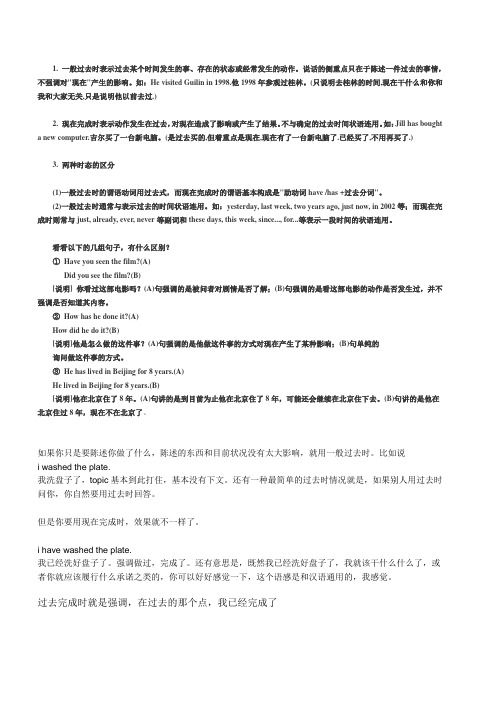
1. 一般过去时表示过去某个时间发生的事、存在的状态或经常发生的动作。
说话的侧重点只在于陈述一件过去的事情,不强调对"现在"产生的影响。
如:He visited Guilin in 1998.他1998年参观过桂林。
(只说明去桂林的时间,现在干什么和你和我和大家无关,只是说明他以前去过.)2. 现在完成时表示动作发生在过去,对现在造成了影响或产生了结果。
不与确定的过去时间状语连用。
如:Jill has boughta new computer.吉尔买了一台新电脑。
(是过去买的,但着重点是现在,现在有了一台新电脑了.已经买了,不用再买了.)3. 两种时态的区分(1)一般过去时的谓语动词用过去式,而现在完成时的谓语基本构成是"助动词have /has +过去分词"。
(2)一般过去时通常与表示过去的时间状语连用。
如:yesterday, last week, two years ago, just now, in 2002等;而现在完成时则常与just, already, ever, never等副词和these days, this week, since..., for...等表示一段时间的状语连用。
看看以下的几组句子,有什么区别?①Have you seen the film?(A)Did you see the film?(B)[说明] 你看过这部电影吗?(A)句强调的是被问者对剧情是否了解;(B)句强调的是看这部电影的动作是否发生过,并不强调是否知道其内容。
②How has he done it?(A)How did he do it?(B)[说明]他是怎么做的这件事?(A)句强调的是他做这件事的方式对现在产生了某种影响;(B)句单纯的询问做这件事的方式。
③He has lived in Beijing for 8 years.(A)He lived in Beijing for 8 years.(B)[说明]他在北京住了8年。
现在完成时与一般过去时的区别
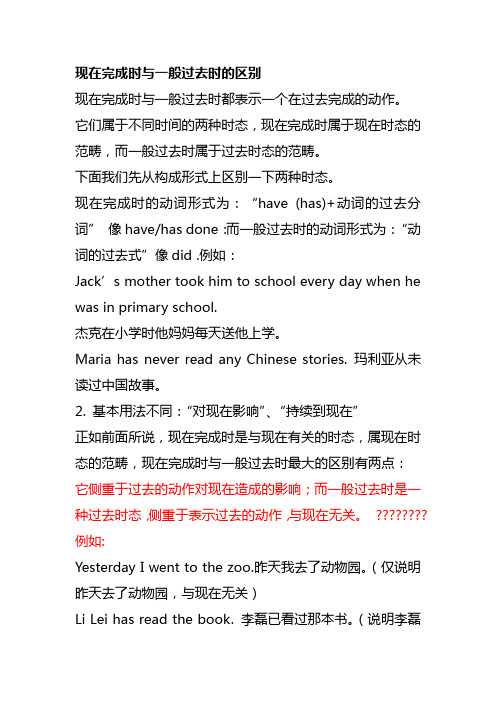
现在完成时与一般过去时的区别现在完成时与一般过去时都表示一个在过去完成的动作。
它们属于不同时间的两种时态,现在完成时属于现在时态的范畴,而一般过去时属于过去时态的范畴。
下面我们先从构成形式上区别一下两种时态。
现在完成时的动词形式为:“have (has)+动词的过去分词”像have/has done:而一般过去时的动词形式为:“动词的过去式”像did .例如:Jack’s mother took him to school every day when he was in primary school.杰克在小学时他妈妈每天送他上学。
Maria has never read any Chinese stories. 玛利亚从未读过中国故事。
2. 基本用法不同:“对现在影响”、“持续到现在”正如前面所说,现在完成时是与现在有关的时态,属现在时态的范畴,现在完成时与一般过去时最大的区别有两点:它侧重于过去的动作对现在造成的影响;而一般过去时是一种过去时态,侧重于表示过去的动作,与现在无关。
????????例如:Yesterday I went to the zoo.昨天我去了动物园。
(仅说明昨天去了动物园,与现在无关)Li Lei has read the book. 李磊已看过那本书。
(说明李磊了解那本书的内容)另外,现在完成时还可以表示动作从过去某个时候开始一直延续到现在,强调动作的延续性它常与for及since引导的一段时间状语连用。
例如:He has lived here for ten years. 他已在这儿住了10年了。
比较:1.)????The Greens have worked in China since 1998.格林一家自1998年到现在一直在中国工作。
The Greens worked in China in 1998.格林一家1998年在中国工作。
2.) He has lived in the country for a long time. 他在农村生活了很长时间。
现在完成时与一般过去时的区别
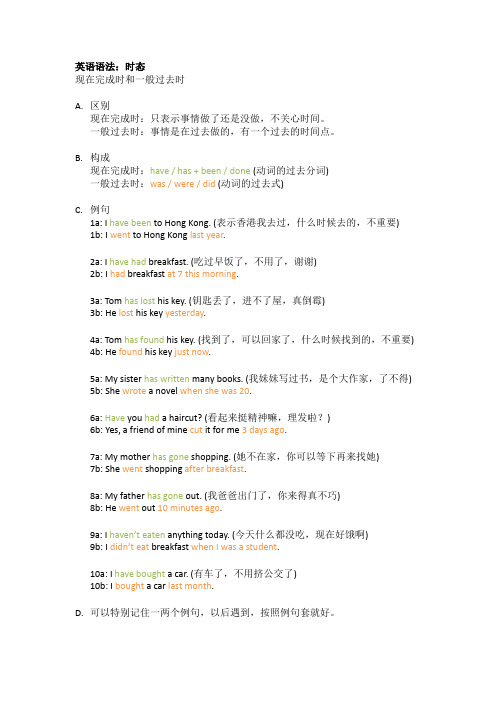
英语语法:时态现在完成时和一般过去时A.区别现在完成时:只表示事情做了还是没做,不关心时间。
一般过去时:事情是在过去做的,有一个过去的时间点。
B.构成现在完成时:have / has + been / done (动词的过去分词)一般过去时:was / were / did (动词的过去式)C.例句1a: I have been to Hong Kong. (表示香港我去过,什么时候去的,不重要) 1b: I went to Hong Kong last year.2a: I have had breakfast. (吃过早饭了,不用了,谢谢)2b: I had breakfast at 7 this morning.3a: Tom has lost his key. (钥匙丢了,进不了屋,真倒霉)3b: He lost his key yesterday.4a: Tom has found his key. (找到了,可以回家了,什么时候找到的,不重要) 4b: He found his key just now.5a: My sister has written many books. (我妹妹写过书,是个大作家,了不得) 5b: She wrote a novel when she was 20.6a: Have you had a haircut? (看起来挺精神嘛,理发啦?)6b: Yes, a friend of mine cut it for me 3 days ago.7a: My mother has gone shopping. (她不在家,你可以等下再来找她)7b: She went shopping after breakfast.8a: My father has gone out. (我爸爸出门了,你来得真不巧)8b: He went out 10 minutes ago.9a: I haven’t eaten anything today. (今天什么都没吃,现在好饿啊)9b: I didn’t eat breakfast when I was a student.10a: I have bought a car. (有车了,不用挤公交了)10b: I bought a car last month.D.可以特别记住一两个例句,以后遇到,按照例句套就好。
现在完成时和一般过去时的比较
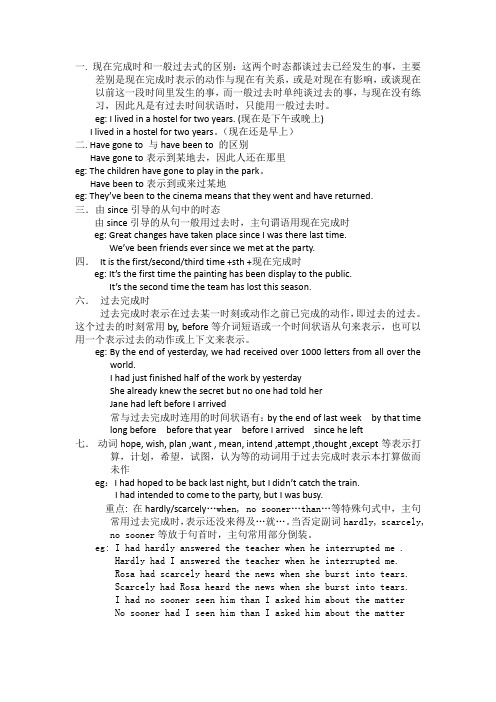
一. 现在完成时和一般过去式的区别:这两个时态都谈过去已经发生的事,主要差别是现在完成时表示的动作与现在有关系,或是对现在有影响,或谈现在以前这一段时间里发生的事,而一般过去时单纯谈过去的事,与现在没有练习,因此凡是有过去时间状语时,只能用一般过去时。
eg: I lived in a hostel for two years. (现在是下午或晚上)I lived in a hostel for two years。
(现在还是早上)二. Have gone to 与have been to 的区别Have gone to表示到某地去,因此人还在那里eg: The children have gone to play in the park。
Have been to表示到或来过某地eg: They’ve been to the cinema means that they went and have returned.三.由since引导的从句中的时态由since引导的从句一般用过去时,主句谓语用现在完成时eg: Great changes have taken place since I was there last time.We’ve been friends ever since we met at the party.四.It is the first/second/third time +sth +现在完成时eg: It’s the first time the painting has been display to the public.It’s the second time the team has lost this season.六.过去完成时过去完成时表示在过去某一时刻或动作之前已完成的动作,即过去的过去。
这个过去的时刻常用by, before等介词短语或一个时间状语从句来表示,也可以用一个表示过去的动作或上下文来表示。
现在完成时与一般过去时的用法区别

现在完成时与一般过去时的用法区别现在完成时和一般过去时是英语中两种不同的时态,它们在用法上有一些区别。
本文将重点探讨这两种时态的用法区别。
一、现在完成时的基本用法现在完成时用于表示过去发生的某个动作或状态与现在的关联。
它通常与以下情况相关:1. 完成的动作对现在造成影响例如:- I have finished my homework.(我已经完成了我的作业。
)这句话表示现在我没有作业要做了。
2. 过去开始的动作或状态一直延续到现在例如:- She has lived in London for five years.(她已经在伦敦住了五年了。
)这句话表示她从过去到现在一直在伦敦居住。
3. 表示已经发生或完成的动作,对时间没有具体的限定例如:- Have you ever been to Japan?(你去过日本吗?)这句话没有具体的时间限定,只是问对方是否去过日本。
二、一般过去时的基本用法一般过去时用于表示过去某个确定的时间或发生的动作或状态。
它通常与以下情况相关:1. 过去某个具体的时间例如:- I went to the park yesterday.(我昨天去了公园。
)这句话表示动作发生在昨天,过去已经完成。
2. 描述过去的事件或情况例如:- She studied in Paris when she was young.(她年轻时在巴黎学习。
)这句话描述的是过去的情况,已经结束。
3. 描述过去的习惯或经常性行为例如:- I used to play basketball every weekend.(过去我每个周末都会打篮球。
)这句话描述的是过去的习惯,不再进行。
三、现在完成时与一般过去时的主要区别现在完成时和一般过去时有以下主要区别:1. 时间范围不同现在完成时没有具体的时间范围限制,可以涉及过去的任何时间点;而一般过去时通常与特定的过去时间相关。
2. 对现在的影响不同现在完成时强调动作或状态与现在的关联,对现在产生影响或结果;而一般过去时则仅仅描述过去发生的动作或状态。
英语现在完成时与一般过去时的区别
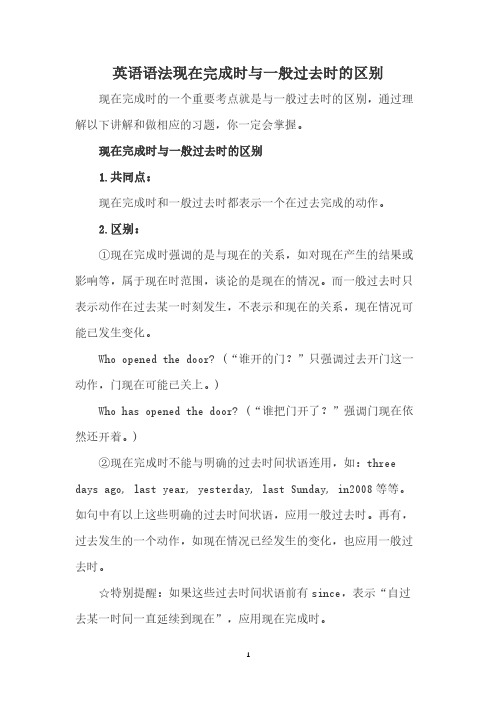
英语语法现在完成时与一般过去时的区别现在完成时的一个重要考点就是与一般过去时的区别,通过理解以下讲解和做相应的习题,你一定会掌握。
现在完成时与一般过去时的区别1.共同点:现在完成时和一般过去时都表示一个在过去完成的动作。
2.区别:①现在完成时强调的是与现在的关系,如对现在产生的结果或影响等,属于现在时范围,谈论的是现在的情况。
而一般过去时只表示动作在过去某一时刻发生,不表示和现在的关系,现在情况可能已发生变化。
Who opened the door? (“谁开的门?”只强调过去开门这一动作,门现在可能已关上。
)Who has opened the door? (“谁把门开了?”强调门现在依然还开着。
)②现在完成时不能与明确的过去时间状语连用,如:three days ago, last year, yesterday, last Sunday, in2008等等。
如句中有以上这些明确的过去时间状语,应用一般过去时。
再有,过去发生的一个动作,如现在情况已经发生的变化,也应用一般过去时。
☆特别提醒:如果这些过去时间状语前有since,表示“自过去某一时间一直延续到现在”,应用现在完成时。
He finished reading the book the day before yesterday.I put my ruler in my pencil-box, but I can’t find it now.My cousin has been in Nanjing since 2009.③现在完成时不与when引导的特殊疑问句连用,when后只用一般过去时表示已发生的动作。
但现在完成时可与where, why等疑问词连用。
如:Where have you been? (你去过哪里了?) --The train has left.--When did the train leave?④since引导的时间状语从句后面用一般过去时,只有前面的主句才用现在完成时。
现在完成时与一般过去时的用法对比

现在完成时与一般过去时的用法对比概述现在完成时和一般过去时是英语中常用的两种时态。
它们在使用和含义上有一些区别,下面将对它们的用法进行对比分析。
现在完成时的用法现在完成时表示动作或状态开始于过去,持续至今或与现在有关的动作或状态。
以下是现在完成时的用法:- 表示过去完成的动作或状态:使用"have/has + 过去分词"的形式。
例如:"I have studied English for five years."(我学英语已经五年了。
)- 表示经验或惯:使用"have/has + 过去分词"的形式。
例如:"She has visited Italy many times."(她去过意大利很多次。
)- 表示一定程度上的变化:使用"have/has + 过去分词"的形式。
例如:"Prices have increased significantly in the last year."(去年物价大幅上涨。
)一般过去时的用法一般过去时用于描述在过去某个特定时间发生或存在的动作或状态。
以下是一般过去时的用法:- 表示过去某一时间发生的动作或存在的状态:使用动词的过去式形式。
例如:"She studied English when she was in college."(她在大学时研究了英语。
)- 表示过去经常发生的动作或存在的状态:在句子中使用副词或短语,如"often"(经常)、"always"(总是)等。
例如:"He always ate breakfast before going to work."(他去上班前总是吃早餐。
)- 表示过去的惯或状态:使用动词的过去式形式。
例如:"She lived in London for ten years."(她在伦敦住了十年。
语法突破现在完成时与一般过去时的时态转换

语法突破现在完成时与一般过去时的时态转换在英语语法中,现在完成时和一般过去时是两种常见的时态。
它们在使用上有一些不同,但也存在一些相似之处。
了解并正确掌握这两种时态之间的转换是提高英语语法水平的关键。
本文将介绍语法突破现在完成时与一般过去时的时态转换。
一、现在完成时的构成和用法现在完成时(Present Perfect)表示过去某个时间点开始的动作或事件一直延续到现在,或者强调过去的经历对现在产生的影响。
现在完成时的构成是:“have/has + 过去分词”。
1. 表示过去经历:I have been to New York twice.2. 表示延续的动作或状态:She has lived in London for five years.3. 表示过去对现在有影响的动作或事件:I have lost my key, so Ican't enter the house.现在完成时的时间状语常常包括:already(已经)、yet(还)、ever(曾经)、never(从未)、just(刚刚)、recently(最近)、for (持续时间)、since(自从)等词。
二、一般过去时的构成和用法一般过去时(Simple Past)表示在过去某个时间发生的动作或事件。
一般过去时的构成是:动词的过去式。
1. 表示过去的某个时间点动作或事件:I studied English yesterday.2. 表示过去的一段时间内发生的动作或事件:He played football for two hours last night.3. 表示过去的习惯或状态:When I was young, I often visited my grandparents.一般过去时的时间状语包括:yesterday(昨天)、last night(昨晚)、last week(上周)、two days ago(两天前)等词。
- 1、下载文档前请自行甄别文档内容的完整性,平台不提供额外的编辑、内容补充、找答案等附加服务。
- 2、"仅部分预览"的文档,不可在线预览部分如存在完整性等问题,可反馈申请退款(可完整预览的文档不适用该条件!)。
- 3、如文档侵犯您的权益,请联系客服反馈,我们会尽快为您处理(人工客服工作时间:9:00-18:30)。
现在完成时专项练习一、用since和for填空1______ two years 2_______ two years ago 3_______lastmonth4______1999 5 _______ yesterday6 _______ 4 o’clock7 ______ 4 hours 8_______ an hour ago9_______ we were children 10 _____ lunch time 11 ______ she left here12. He has lived in Nanjing ________ the year before last.13. I’ve known him __________ we were children.14. Our teacher has studied Japanese _________ three years.15. She has been away from the city ___________ about ten years.16 It’s about ten years __________ she left the city.17 How long have you been here?-______ half past three.18How long has that car been here?-______ yesterday.19 How long have you been in this school?-______ four years.20 How long has that boy been in your class?-______ six weeks.21 How long have you lived here?-______ 1996二、用have(has) been、have(has) gone 、have/has been to/in, have gone to填空。
1、A: Where ____________ Li Fei ___________?B: He ____________ to Hainan Island.A: How long ___________ he ___________ there?B: He _____________ there for three days.A: When will he come back , do you know?B: I’m afraid he won’t come back recently.A: Could you tell me the way to Hainan Island?B: Sorry, I _________ never ___________ there.A: How many times ___________ Li Fei __________ to that place?B: He _____________ there only once.2、Where is Jack? He __________ his country.John _______ England since he came back.How long _____ he _____ this village?The Smiths ______ Beijing for years._____ you ever ____ America? -- Yes, I _____ there many times.I _____ this school since three years ago.三、选择填空( )1.Jim's been to the Great wall before ,__________he?(A)isn't (B)wasn't (C)hasn't (D)doesn't( )2.She's never been to England, _______she?(A)has (B)hasn't (C)isn't (D)is( )2.___________has Hanmei been in the library?(A)How long (B)How soon (C)How far (D)How often( )3.How long ___he______ the library book ?(A)has, borrow (B)has ,kept (C)has, bought (D)did, buy( )4.Mr Green isn't in the office , He __________to the library (A)has gone (B)went (C)has been (D)will go( )5.Mr smith _______to Tokyo and he will be back in a week(A)has been (B)has visited (C)has sent (D)has gone ( )6.They_________China for two years(A)have been to (B)have been in (c)have gone to (D)have come to( )7. —I’m sorry, Mary, I ______ your radio for such a long time.—Never mind.A. keepB. keptC. have keptD. am keeping( )8 —Where have you ______ these days?—I have ______ to Yangzhou with my friends.A. been, goneB. been, beenC. gone, beenD. gone, gone( )9. —Where is your father? We haven’t seen each other for weeks. —______.A. He has been to AmericaB. He has gone to EnglandC. He is going to AustraliaD. He would visit my grandparents( )10. They have ______ since the factory opened.A. left the schoolB. joined the teamC. worked here( )11. Jim ______ the Great Wall many times.A. went toB. goes toC. has gone toD. has been to( )12. —______ to the United States?—No, never, but I went to Canada a few years ago.A. Have you beenB. Have you goneC. Did you goD. Will you go( )13. I won’t go to see the film tonight because I ______ my ticket.A. didn’t loseB. have lostC. will loseD. didn’t have( )14. Miss Wu has taught in this school ______.A. for ten yearsB. ten years agoC. since ten yearsD. for ten years ago( )15. I ______ today’s homework already. What about you?A. have finishedB. finishC. to finishD. finishing( )16. ——Have you finished your homework ——Yes, I _______it last night(A)finish (B)finished (C)have finished (D)will finish( )17 ________you ever _______to Nanjin ——Yes, I ______there last year.(A)Have…gone, have gone (B)Have…been , went(C)Did…go, went (D)Did…go, has , been( )18——When _______you ________Lucy in New York?——I _________here for two years(A)did…meet, haven't seen (B)did…meet, haven't seen(C)did…meet, don't see (D)would…meet, hadn't seen( )19.He ______finished his homework. yet(A)doesn’t (B)haven’t (C) hasn’t (D) doesn’t have( )20.——Have you ________traveled on the train. ——Yes, I have.(A)never (B)ever (C)just (D)yet( )21.——Have you finished your homework——Not__________ .(A)ever (B)already (C)yet (D)just( )22. We haven't finished our homework .(A)already (B)ever (C)yet (D)never( )23.—Have you__________ learned English? —Yes, I've ________learned a lot.(A)never, ever (B)ever, never (C)ever, already (D)already. ever ( )24.——Have you finished your homework ___? —Yes, I've___done that(A)yet, already (B)already, yet (C)ever, never (D)still, just( )25.John's father _______borrowed some pictures(A)have already (B)has just (C)have ever (D)has yet( )26.I've been like this ever since _________(A)last week (B) for a week (C) a week before (D)the last week ( )27.My mother has worked in this factory _____2 years.(A)about (B)for (C)in (D)since( )28. I haven't heard from him ______last week.(A)since (B) for (C)ago (D)before( )29.His father joined the party_________A、for three yearsB、since three years agoC、three years agoD、in two years' time( )30. – Where is Mr. Liu? ----- He _______the library.A. has been toB. has gone toC. has been in( )31. The students have cleaned the classroom , ________?A. so theyB. don’t theyC. have theyD. haven’t they( )32. I like Hainan. I ________there three times.A. wentB. goC. have beenD. have gone( )33.We came to Nanjing three years ago, so we ________ here for three years.A. have been toB. have been inC. have beenD. have gone( )34.- How long ______you_______ your dictionary? - About two months.A. did; buyB. have; getC. have; hadD. have; bought( )35 He tells me he________ China for over five years.A. has beenB. has been inC. has been toD. has gone to( )36.___has Mr White been a member of Greener China since he _______ to China?A. How soon , comesB. How often, gotC. How long , cameD. How far, arrived( )37. His uncle________ for more than 9 years.A. has come hereB. has started to workC. has lived thereD. has left the university( )38.I_______ a letter from him since he left.A.didn't receive B.haven't got C.didn't have D.haven't heard ( )39.—Where have you _______ these days?—I have to Dazhu with my friends.A.been;gone B.been;been C.gone;been D.gone;gone( )40.How long have you _______ this book?A.bought B.borrowed C.had D.lent( )41.—Where's Peter?—He _______ to Nanjing.A.is going B.has been C.has gone D.went( )42.You've never seen such a wonderful film before,_______ ?A.haven't you B.have you C.do you D.don't you( )43.We have lived here _______ five years ago.A.when B.since C.before D.after( )44.—I have watched the game.—When you _______ it?A.have;watched B.do;watch C.did;watch D.will;watch ( )45.—How do you like Beijing,Mr Black?—Oh,I _______ such a beautiful city.A.don't visit B.didn't visit C.haven't visited D.hadn't visited ( )46.The old people _______ lonely at all since we began to visit them once a week.A.don't feel B.hasn't felt C.haven't felt D.didn't feel( )47.My grandfather_______ in the small town all his life.He always says he likes the town. A.lived B.have lived C.has lived D.is living( )48.Miss Brown _______ to the Great Wall twice.A.have been B.has been C.have gone D.has gone( )49.His brother has been to Stone Forest twice _______ he came to Yunnan.A.after B.before C.since D.for( )50.His grandpa _______ for two years.A.was died B.has been dead C.was dead D.has died( )51.—Have you ever_______ to Haikou?—Yes,I_______ there with my family last August.(海南省)A.gone;went B.been;went C.been;went to D.been;was in ( )52.His sister _______ her hometown for three years.She'll return next year.A.left B.has left C.has been away D.has been away from( )53.Paper money ____ for over a thousand years.A.used B.has been used C.has used D.is using( )54.Great changes ____ in my hometownA.have been taken place; B.have taken place;C.are taken place; D.had taken place;( )55.The fire ____to the fifth floor.____ all the people____?A.has got;Have;been saved B.has been got;Have;savedC.has got;Do;save D.has got;Have;saved( )56. --- Where __you __ (put) the book? I can’t see it anywhere.--- I ___(put) it right here. But now it’s gone.A. did ; put; putB. have; put; putC. did; put; have putD. have; put; have put ( )57. Hello, I ____ you were in London. How long _________ here?A. don’t know; were youB. hadn’t known; are youC. haven’t known; areD. didn’t know; have you been( )58. He has made a lot of friends____________.A. in the pastB. years agoC. beforeD. just now( )59. I’ve _______ here for only one day.A. gotB. arrivedC. reachedD. been( ) 60. I know him ___________.A. very muchB. very manyC. very goodD. very well ( )61_____ you just _______breakfast?A. Did, haveB. Have, hadC. Do, haveD. Will, have ( ) 62. How long has he _____________? A. kept the book B . had the car C. been in the club D. All the above用括号里所给的单词的正确形式填空。
